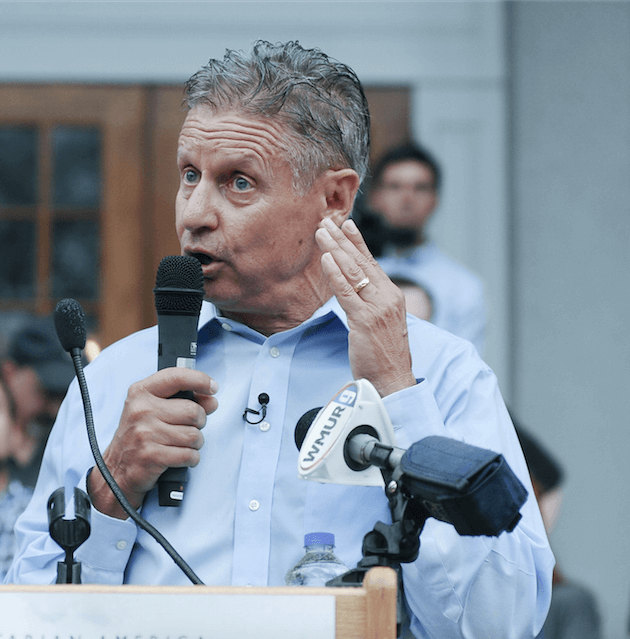The Gary Johnson defense plan is more non-interventionist than we’re accustomed to hearing from politicians.
The Libertarian Party candidate wants to stay out of other countries unless they strike first, and find non-military means for addressing the threats we face. The plan bodes some similarity to that of Green Party candidate Jill Stein, though they have differences in terms of budgets, bases and nuclear weapons.
Non-interventionist
Johnson thinks the United States should only get involved with another country militarily if that country (or someone in it) has directly attacked the United States. Thus, he has been opposed to most military interventions since 9/11, including those in Iraq and Syria. Johnson believes that American interventions abroad have made us less safe by destabilizing regions and sowing anti-American sentiment.
In order for the United States to put “boots on the ground,” as they say, in another country, Johnson thinks the president should need to get approval from Congress. This would prevent POTUS from going rogue and making big military decisions on his or her own.
Cut the budget
Johnson thinks the United States’ defense budget is way too high because of our meddling abroad. He says that we can probably afford to cut the budget by 20 percent without sacrificing our security. He referred to a Defense Base Closure and Realignment Commission (BRAC) report, which stated that the military has 22 percent more infrastructure and installation space than it needs, to argue that the Pentagon supports closing about 20 percent of military bases.
We should note two things here:
1) This is an example of one cost-saving measure, not the whole shebang, since cutting 20 percent of bases wouldn’t necessarily cut 20 percent of military spending
2) The BRAC report’s estimate concerned infrastructure and space, not whole individual bases; therefore, it didn’t actually recommend the closure of 20 percent of bases.
Johnson’s military budget proposal is a more modest one than what he put forth during his 2012 presidential candidacy, when he advocated for a 43 percent reduction in military spending, and a reduction of our nuclear weapons arsenal from 2,300 to 500 weapons.
The United States spends more on its defense budget than the next highest seven or eight countries combined. Proponents of maintaining or expanding the budget claim that it is necessary to counter the threats we face and to maintain our obligations around the world, while opponents, like Johnson, think we’re too involved in interventions abroad.
No drones
One of the staples of President Barack Obama’s defense plan has been the use of drone strikes abroad as a way of pursuing terrorists without committing troops on the ground. Johnson is not about it.
[postquote]
“When it comes to drones, I think it makes a bad situation even worse,” Johnson said in a November interview with Reason, a Libertarian blog. “We end up killing innocents and fueling hatred as opposed to containing it. It just hasn’t worked.”
The number of civilian casualties from drone strikes abroad is not known. In 2015, The Obama Administration claimed that between 64 and 116 civilians total had been killed in drone strikes in Yemen, Pakistan, and Africa during its tenure (leaving out Iraq and Syria, where strikes occur very frequently).
However, data from the Bureau of Investigative Journalism shows a higher civilian casualty tally for Pakistan alone. They also note that a majority of people killed have fallen into the “Other” category; any able-bodied male killed in a drone strike is put into this category unless he is proven to be a civilian. We don’t actually know how many in this category were combatants or civilians.
Cutting off funds
Johnson thinks the way to deal with the threat of ISIS is to focus not on sending troops or drones to other countries, but on cutting off the group’s funding.
He hasn’t been very specific about how to do that, but he has said that Iran is the biggest funder of terrorism. He was critical of the Iran Nuclear Deal because it unfroze Iran’s assets, allowing the nation, Johnson says, to further fund terrorism.
A frank assessment
While Johnson has a plan to weaken ISIS and to keep the United States safer by adopting a non-interventionist approach to foreign policy, he’s quite frank about his view that, at the end of the day, you can’t completely wipe out terrorism.
Referring to himself and his VP pick, Bill Weld, he said during an August town hall when asked how he’d prevent attacks in the United States:
Maybe we’re the kind of candidates that are gonna say, ‘look, this stuff is gonna happen.’ Yes, a president of the United States — we need to be vigilant to potentially prevent these things from happening, but these things are gonna happen.
Takeaway
Johnson doesn’t think any president can completely do away with terrorism. But he thinks we could do a much better job of it in the United States by keeping our military and our drones out of other countries for the most part.
Have something to add to this story? Comment below or join the discussion on Facebook.
Header image: Shutterstock









































